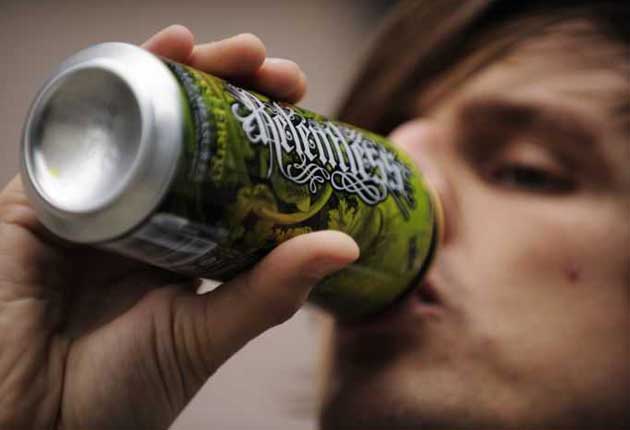Energy drinks can trigger sudden cardiac arrest even in healthy young people, study finds
Almost one in three 12 to 19-year-olds regularly consume the drinks which often contain high levels of caffeine that can be bad for the heart

Your support helps us to tell the story
From reproductive rights to climate change to Big Tech, The Independent is on the ground when the story is developing. Whether it's investigating the financials of Elon Musk's pro-Trump PAC or producing our latest documentary, 'The A Word', which shines a light on the American women fighting for reproductive rights, we know how important it is to parse out the facts from the messaging.
At such a critical moment in US history, we need reporters on the ground. Your donation allows us to keep sending journalists to speak to both sides of the story.
The Independent is trusted by Americans across the entire political spectrum. And unlike many other quality news outlets, we choose not to lock Americans out of our reporting and analysis with paywalls. We believe quality journalism should be available to everyone, paid for by those who can afford it.
Your support makes all the difference.Too many energy drinks can trigger sudden cardiac arrest even in healthy people, according to scientists who warned parents to watch how many cans their children consume.
Almost one in three 12 to 19-year-olds regularly consume the drinks which often contain high levels of caffeine that can be bad for the heart. They can also contain “hidden” caffeine in the form of ‘masking agents’ such as gurana, which comes from a Brazilian plant and is identical to caffeine found in coffee beans but at twice the concentration.
Adding guarana and other popular substances, such as ginseng and taurine, to these types of drinks may generate “uncertain interactions”, the researchers said.
Their work focused on the pharmacology of energy drinks (EDs) among children and young adults. The team also studied how the marketing of EDs as a means to relive fatigue and improve physical performance may be ignoring real dangers.
The energy drink market is booming. Sales rose from 454m litres in 2011 to more than 550m litres last year – a market value that climbed from £1bn to £1.3bn, according to a report by Mintel. It predicted sales would rise to around 650m litres by 2019 helped by high profile advertising campaigns from sports stars such as footballers Steven Gerrard and Gareth Bale.

Although caffeine, defined as a drug because it stimulates the central nervous system, is widely used and generally regarded as safe, serious adverse effects have been reported, especially when consumed in larger doses.
According to Lucozade’s website, a one litre Lucozade Energy bottle will contain approximately 120mg of caffeine, varying slightly for different flavours.
The Food Standards Agency recommends: “Children, or other people sensitive to caffeine, should only consume caffeine in moderation. Pregnant women are advised not to have more than 200mg of caffeine a day, roughly two mugs of instant coffee.”
The international research team based at the Research Institute of Hospital 12 de Octubre in Madrid, Spain, warned that energy drinks can trigger sudden cardiac deaths in young, apparently healthy individuals.
“The rapid rise in popularity of energy drinks, particularly among adolescents, aged 10-19 years, and young adults, has serious implications for cardiac health,” lead researcher Dr Fabian Sanchis-Gomar said in an article published in the Canadian Journal of Cardiology. “As ED consumption continues to grow, physicians are advised to ask adolescent patients whether they consume EDs, to be aware of the symptoms of ED overconsumption, and to discuss the dangers of EDs alone and mixed with alcohol.”
The scientists said one 250ml can per day is safe “for most healthy adolescents” and that ED consumption before or during sports practice should be avoided. They said adolescents with clinically relevant underlying medical conditions should consult cardiologists before drinking EDs.
Dr Sanchis-Gomar said: “Excessive ED consumption together with alcohol or other drugs, or both, may lead to adverse effects, including death. “With a range of readily available sources, such as energy drinks, gums and inhalers, adolescents and young adults can easily overdose. It is estimated that as many as 46 per cent of the 5,448 caffeine overdoses reported in the United States in 2007 occurred in adolescents younger than 19 years.”
Cardiologists have urged doctors, parents and teachers to monitor adolescents’ energy drink consumption more closely.
London-based cardiologist Assem Malhotra said: “This new research is very concerning. Any excess consumption of stimulants does increase the risk of symptomatic and distressing palpitations for many people and children in particular should be avoiding energy drinks as much as possible especially as they may also trigger sudden cardiac death in vulnerable people. I personally believe energy drinks should be banned for kids. “
Join our commenting forum
Join thought-provoking conversations, follow other Independent readers and see their replies
Comments